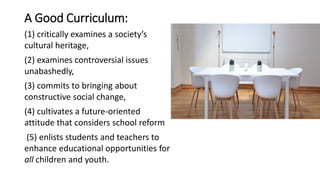Reconstructionism, education and curriculum
- 1. Reconstructionism, Education and Curriculum Presented by Masoud Mahmoodi-Shahrebabaki
- 2. Background • Great Depression • Reconstructionist philosophy is based on socialistic and utopian ideas
- 3. Theodore Brameld`s Perspective • Theodore Brameld, often credited with coining reconstructionism in 1950 (actually, Dewey coined the term), asserted that reconstructionism is a crisis philosophy and, therefore, suited to today’s society, which is in crisis.
- 4. Meeting of the Progressive Education Association 1932 • George Counts urged progressive educators to consider the era’s social and economic problems and use the schools to help reform society “Dare the School Build a New Social Order?”
- 5. John Dewey's Perspective “we are doubtless far from realizing the potential of education as a constructive agency of improving society, from realizing that it represents not only a development of children and youth but also of the future society of which they will be the constituents’” (Dewey 1985).
- 6. Reconstructionism vs Progressivism • For them progressivism was too one-sided in its interest in the individual • progressivism overemphasized child-centered education and mainly served the middle and upper classes with its play theories and private schools. • Reconstructionist advocated greater emphasis on society- centered education that addressed the needs of all social classes
- 7. Basic principles in Education Students and teachers must improve society Classroom political neutrality, disguised as objectivity and scientific inquiry, does not suit the democratic process Teachers and students have a right to take sides, to stand up for the best reasoned and informed partialities they can reach as a result of free, meticulous examination and communication of all relevant
- 8. Role of Teachers • Teachers must measure up to their social responsibilities. • Teacher are agents of societal change • Teachers should strengthen control of the schools by and for the goal- seeking interests of the majority of mankind.
- 9. Basic principles in Curriculum • Curriculum must be transformed in keeping with a new social-economic- political education • It must incorporate reform strategies • Society is always changing, and the curriculum has to change. • A curriculum based on social issues and services is ideal.
- 10. A Good Curriculum: (1) critically examines a society’s cultural heritage, (2) examines controversial issues unabashedly, (3) commits to bringing about constructive social change, (4) cultivates a future-oriented attitude that considers school reform (5) enlists students and teachers to enhance educational opportunities for all children and youth.
- 11. Legacy : Critical Pedagogy • students have the capacity to think, question, and be critical. • Teachers and schools need to educate students to be informed citizens and agents for change. • The students must be viewed as the major resource for promoting and protecting democracy
- 12. Neo- reconstrutivism or global reconstrutivism • Historically, the United States has taken a relatively isolationist position, • Interdependence among nations no longer allows Americans to remain ignorant of developments in distant countries. • Educators now feel the need to emphasize understanding of other nations and cultures.
- 13. Example
- 14. • Shallow • Unrealistic • Ineffective • Unpopular













